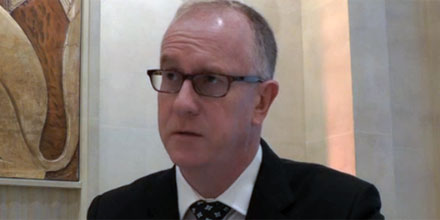By Matthew Goodburn, Citywire global
The eurozone could now withstand a Greek exit from the single currency if history was to repeat itself, according to Newton’s head of fixed income, Paul Brain.
The Citywire A-rated manager told Citywire Global a so-called ‘Grexit’ would have nowhere near the huge impact it did two years ago.
Brain said the previous flirtation with an exit from the eurozone had created huge volatility and caused peripheral European government bonds to spike but this would be unlikely to occur now.
'The game has changed hugely since then and the euro crisis has passed. The ECB has made it clear that it will support all European bonds but we still think Greece looks vulnerable. The difference this time is that the eurozone could survive a Greek exit.'
His comments come at a time when his peers, such as Citywire AA-rated Torgeir Høien, have sold all Greek exposure over fears of uncertainty returning to the market.
Brain said that while huge progress has been made by European banks in terms of raising more capital, he believes Greece is still finding it tough as the populace has grown tired of austerity.
'Greece has a huge debt problem it can't cope with and a population that has grown tired of the stresses and strains of dealing with the mechanisms of the system. I think it could be allowed to restructure separately to the euro,’ he said.
Brain pointed to 10-year Greek bond yields ticking up to 8.18% [on 26 November] while Italian 10-year government bonds were down at 2.08%, down seven basis points on the day.
'Until recently, concerns over Greece would have produced much more dramatic moves in the market but not anymore,’ Brain said.
Picking apart the periphery
Brain started reducing his peripheral European government bond exposure in the summer by selling out of positions in Spain and Italy. These stakes were recycled into French OATs and UK gilts.
More recently, in his BNY Mellon Global Bond and BNY Mellon Global Dynamic Bond funds, Brain has been reducing his high yield exposure. This has gone from 25% to 15%, with the proceeds reinvested primarily into US treasuries.
Elsewhere, Brain has about 11% of his portfolios in emerging market bonds, through a mix of hard and local currency. 'We have often been using euro denominated bonds because we can get a wider spread compared to US dollars.'
Brain has been very selective in terms of country selection in the EM segment of the asset class, and he remains wary of South Africa, Turkey and Brazil, which are all struggling to service their deficits.
In contrast he has euro-denominated exposure to bonds in Mexico, South Korea and Bulgaria, describing all three as offering decent credit stories.
The BNY Mellon Global Bond fund has lost 4% over the three years to the end of October 2014. This is while its Citywire benchmark, the JP Morgan Global GBI Unhedged, fell 4%.
Meanwhile, the BNY Mellon Global Dynamic Bond fund has returned 15.3% over the same timeframe, while the average manger in the Bonds – Absolute Return sector returned 4.2% over the same period.



















